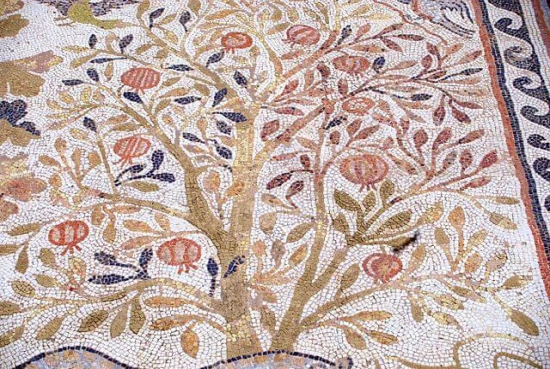1
Ego Nabuchodonosor quietus eram in domo mea, et florens in palatio meo :
2
somnium vidi, quod perterruit me : et cogitationes meæ in strato meo, et visiones capitis mei conturbaverunt me.
3
Et per me propositum est decretum ut introducerentur in conspectu meo cuncti sapientes Babylonis, et ut solutionem somnii indicarent mihi.
4
Tunc ingrediebantur arioli, magi, Chaldæi, et aruspices, et somnium narravi in conspectu eorum : et solutionem ejus non indicaverunt mihi,
5
donec collega ingressus est in conspectu meo Daniel, cui nomen Baltassar secundum nomen dei mei, qui habet spiritum deorum sanctorum in semetipso : et somnium coram ipso locutus sum.
6
Baltassar, princeps ariolorum, quoniam ego scio quod spiritum sanctorum deorum habeas in te, et omne sacramentum non est impossibile tibi : visiones somniorum meorum, quas vidi, et solutionem earum narra.
7
Visio capitis mei in cubili meo : videbam, et ecce arbor in medio terræ, et altitudo ejus nimia.
8
Magna arbor, et fortis, et proceritas ejus contingens cælum : aspectus illius erat usque ad terminos universæ terræ.
9
Folia ejus pulcherrima, et fructus ejus nimius : et esca universorum in ea. Subter eam habitabant animalia et bestiæ, et in ramis ejus conversabantur volucres cæli : et ex ea vescebatur omnis caro.
10
Videbam in visione capitis mei super stratum meum, et ecce vigil, et sanctus, de cælo descendit.
11
Clamavit fortiter, et sic ait : Succidite arborem, et præcidite ramos ejus : excutite folia ejus, et dispergite fructus ejus : fugiant bestiæ, quæ subter eam sunt, et volucres de ramis ejus.
12
Verumtamen germen radicum ejus in terra sinite, et alligetur vinculo ferreo et æreo in herbis quæ foris sunt, et rore cæli tingatur, et cum feris pars ejus in herba terræ.
13
Cor ejus ab humano commutetur, et cor feræ detur ei : et septem tempora mutentur super eum.
14
In sententia vigilum decretum est, et sermo sanctorum, et petitio : donec cognoscant viventes quoniam dominatur Excelsus in regno hominum, et cuicumque voluerit, dabit illud, et humillimum hominem constituet super eum.
15
Hoc somnium vidi ego Nabuchodonosor rex : tu ergo Baltassar interpretationem narra festinus, quia omnes sapientes regni mei non queunt solutionem edicere mihi : tu autem potes, quia spiritus deorum sanctorum in te est.
16
Tunc Daniel, cujus nomen Baltassar, cœpit intra semetipsum tacitus cogitare quasi una hora : et cogitationes ejus conturbabant eum. Respondens autem rex, ait : Baltassar, somnium et interpretatio ejus non conturbent te. Respondit Baltassar, et dixit : Domine mi, somnium his, qui te oderunt, et interpretatio ejus hostibus tuis sit.
17
Arborem, quam vidisti sublimem atque robustam, cujus altitudo pertingit ad cælum, et aspectus illius in omnem terram ;
18
et rami ejus pulcherrimi, et fructus ejus nimius, et esca omnium in ea, subter eam habitantes bestiæ agri, et in ramis ejus commorantes aves cæli :
19
tu es rex, qui magnificatus es, et invaluisti : et magnitudo tua crevit, et pervenit usque ad cælum, et potestas tua in terminos universæ terræ.
20
Quod autem vidit rex vigilem, et sanctum descendere de cælo, et dicere : Succidite arborem, et dissipate illam, attamen germen radicum ejus in terra dimittite, et vinciatur ferro et ære in herbis foris, et rore cæli conspergatur, et cum feris sit pabulum ejus, donec septem tempora mutentur super eum :
21
hæc est interpretatio sententiæ Altissimi, quæ pervenit super dominum meum regem,
22
Ejicient te ab hominibus, et cum bestiis ferisque erit habitatio tua, et fœnum ut bos comedes, et rore cæli infunderis : septem quoque tempora mutabuntur super te, donec scias quod dominetur Excelsus super regnum hominum, et cuicumque voluerit, det illud.
23
Quod autem præcepit ut relinqueretur germen radicum ejus, id est arboris : regnum tuum tibi manebit postquam cognoveris potestatem esse cælestem.
24
Quam ob rem, rex, consilium meum placeat tibi, et peccata tua eleemosynis redime, et iniquitates tuas misericordiis pauperum : forsitan ignoscet delictis tuis.
25
Omnia hæc venerunt super Nabuchodonosor regem.
26
Post finem mensium duodecim, in aula Babylonis deambulabat.
27
Responditque rex, et ait : Nonne hæc est Babylon magna, quam ego ædificavi in domum regni, in robore fortitudinis meæ, et in gloria decoris mei ?
28
Cumque sermo adhuc esset in ore regis, vox de cælo ruit : Tibi dicitur, Nabuchodonosor rex : Regnum tuum transibit a te,
29
et ab hominibus ejicient te, et cum bestiis et feris erit habitatio tua : fœnum quasi bos comedes, et septem tempora mutabuntur super te, donec scias quod dominetur Excelsus in regno hominum, et cuicumque voluerit, det illud.
30
Eadem hora sermo completus est super Nabuchodonosor, et ex hominibus abjectus est, et fœnum ut bos comedit, et rore cæli corpus ejus infectum est, donec capilli ejus in similitudinem aquilarum crescerent, et ungues ejus quasi avium.
31
Igitur post finem dierum, ego Nabuchodonosor oculos meos ad cælum levavi, et sensus meus redditus est mihi : et Altissimo benedixi, et viventem in sempiternum laudavi et glorificavi : quia potestas ejus potestas sempiterna, et regnum ejus in generationem et generationem.
32
Et omnes habitatores terræ apud eum in nihilum reputati sunt : juxta voluntatem enim suam facit tam in virtutibus cæli quam in habitatoribus terræ : et non est qui resistat manui ejus, et dicat ei : Quare fecisti ?
33
In ipso tempore sensus meus reversus est ad me, et ad honorem regni mei, decoremque perveni : et figura mea reversa est ad me, et optimates mei et magistratus mei requisierunt me, et in regno meo restitutus sum : et magnificentia amplior addita est mihi.
34
Nunc igitur, ego Nabuchodonosor laudo, et magnifico, et glorifico regem cæli : quia omnia opera ejus vera, et viæ ejus judicia, et gradientes in superbia potest humiliare.







